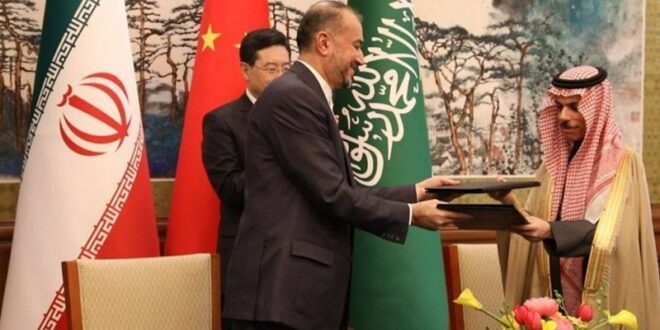In March 2023, Iran and Saudi Arabia agreed to re-establish diplomatic relations, with China playing a role as the host of the talks. This generated considerable discussion among policymakers and the scholarly community. Some believed this indicated a new change in China’s approach to the Middle East, which has primarily focused on commercial relations.
But the assumption that China is about to take on a more prominent and active role as a conflict mediator in the Gulf region is overstated. Although Beijing hosted the talks that led to the agreement, much of the substantive work had been done earlier, primarily by Iraq and Oman. China’s late involvement was also enabled because the United States does not have relations with Iran, making it difficult for the United States to broker a deal.
China’s participation was like its earlier efforts at regional conflict management. Between 2004–07 it tried to bridge the gap between the international community and the Sudanese regime during the Darfur crisis. Beijing then did something similar in 2013–15 between the West and Iran over the Iranian nuclear program, culminating in the Joint Comprehensive Plan of Action. In both cases, Chinese involvement was helped by a pre-established framework of dialogue and the willingness of each side to involve Beijing.
Discussion since the Saudi–Iran agreement has moved on to how China might guarantee relations between the two rivals. This makes too much of the agreement, which was limited to restarting diplomatic ties. Even if China had the will, it lacks the capacity to impose itself on the two signatories, not least because several grievances persist between them. They include Iran’s creeping nuclear militarisation and their contrary stances over the civil war in Yemen — though there are signs that the two sides may be starting to find some common ground.
Even if China cannot ensure future stability, there are sufficient incentives from within the region that might make this possible. Iran and Saudi Arabia had good reasons to reach an agreement with each other. On the Saudi side, there is a sense that Washington has become less reliable. At the same time, Riyadh realises that diversifying relations is no bad thing — Saudi Arabia’s commercial ties have grown substantially with China over the past two decades. Between 2005 to 2022, Chinese investments in Saudi Arabia totalled US$12.78 billion compared to US$4.72 billion in Iran.
Meanwhile, Iran is struggling economically. Between 2012 and 2021 its GDP almost halved, from US$644 billion to US$360 billion, exacerbated by sanctions. It also faced widespread protests against the killing of Mahsa Amini in police custody in 2022, prompting it to crack down on protestors. Compared to the Saudis, Iran has fewer available alternatives. Although it signed an investment contract with China two years ago, there has been little sign that it has led to any substantial increase in resources. Having China host diplomatic talks with the Saudis may have been Iran’s way of staying in Beijing’s line of sight.
The agreement from both sides to involve China will potentially reduce part of the Gulf rivalry while also indicating that China may be becoming aware that its growing economic profile brings with it political implications. China has long sought to avoid becoming entangled in regional tensions and conflicts. But that is proving harder than it seems. Following the Gulf Cooperation Council (GCC) summit with China in December 2022, a joint declaration reiterated the GCC’s long-standing support for the United Arab Emirates’ claims over the Tunb and Abu Musa islands. Tehran also claims these islands and summoned the Chinese ambassador post-announcement.
The Chinese now appear more attentive towards tensions in the Gulf. On the eve of his visit to the Gulf in 2021, then foreign minister Wang Yi published China’s Five-Point Plan. It referred to the need for collective and regionally generated security in the Gulf. Wang pointed to the need for a ‘trust mechanism’ along with ‘safety for oil facilities and shipping lanes’.
While it is notable that China was involved in the final stages of the reestablishment of diplomatic relations between Saudi Arabia and Iran, it is important not to exaggerate either the nature of the agreement nor China’s role in the region. Other regional conflicts, like those in Syria, Israel–Palestine, Libya or Yemen are likely to remain beyond Chinese intervention.
So long as conflicting parties and their external backers view the current benefits of continued conflict as outweighing the costs of ending them, it will be unattractive for a third party like China to mediate. If Beijing judges that acting as a mediator may help boost its stature, it may conclude that failure to achieve a successful outcome might damage its wider regional credibility.
So long as Saudi–Iran relations are perceived to be on an upward trajectory, this will benefit them as well as Beijing and its regional standing. But should they start to stall or deteriorate, this could be adverse for China’s dabbling in regional politics. Perhaps for this reason, Beijing has so far shied away from adopting a more sustained and engaged approach towards the two regional rivals.
*About the author: Guy Burton is Adjunct Professor at the Brussels School of Governance and a Fellow in the Sectarianism, Proxies and De-sectarianisation Project at Lancaster University.
 Eurasia Press & News
Eurasia Press & News



